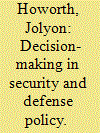| Srl | Item |
| 1 |
ID:
116682


|
|
|
|
|
| Publication |
2012.
|
| Summary/Abstract |
For scholars and practitioners of European politics alike, the distinction between supranationalism and inter-governmentalism has always been fundamental. This distinction has underpinned the various schools of European integration theory, just as it has remained crucial for European governments keen to demonstrate that the Member States remain in charge of key policy areas. Nowhere is this considered to be more central than in the area of foreign and security policy, which has consciously been set within the rigid intergovernmental framework of Pillar Two of the Maastricht Treaty and, under the Lisbon Treaty, remains subject to the unanimity rule. However, scholarship on the major decision-making agencies of the foreign and security policy of the EU suggests that the distinction is not only blurred but increasingly meaningless. This article demonstrates that, in virtually every case, decisions are shaped and even taken by small groups of relatively well-socialized officials in the key committees acting in a mode which is as close to supranational as it is to intergovernmental.
|
|
|
|
|
|
|
|
|
|
|
|
|
|
|
|
| 2 |
ID:
083384


|
|
|
|
|
| Publication |
2008.
|
| Summary/Abstract |
German reunification, the end of the Cold War, and the fall of the iron curtain, as well as the large number of Eastern European countries from the former Eastern bloc that have gradually became members of the EU and/or NATO partners, have resulted in Germany 'moving' from the geographical periphery of the Cold War period into the centre of both the European Union and NATO alliances. This change in the security environment has had an impact on the German security and defence policy and has led to a process of continuous restructuring and resizing of Germany's armed forces, rendering large numbers of military SALW surplus. While in the immediate aftermath of unification, exports were initially chosen as the main means to reduce surplus weapons, this policy was changed to destruction becoming the means of reducing surplus stocks: from 1990 to 2006, the German military destroyed a total of 2,076,442 SALW from its own inventories, accomplished entirely through domestic processes.
While the inheritance of an entire army and its weapons constitute a context-specific example, one technique can be drawn from the German case: surplus is identified by determining the national armament and security requirements, where surplus is anything left over. This method implies that international efforts to destroy surplus weapons should focus on assisting countries to determine what their armament requirements are; this would facilitate determining the quantity of arms over and beyond this armament requirement as surplus, which could then be easily destroyed
|
|
|
|
|
|
|
|
|
|
|
|
|
|
|
|
| 3 |
ID:
160314


|
|
|
|
|
| Summary/Abstract |
The European Common Security and Defence Policy (CSDP) has often been a paper tiger lacking the required tools to translate the EU’s goals and objectives into action on the ground. At the core of this problem is an enduring expectations–capabilities gap rooted in the meagre results of joint military capability development of CSDP member states. Many actors in the field, who work under conditions of hierarchical interaction favouring nation states over other actors, hamper the execution of joint projects. Those planned are jeopardised by a lack of shared strategic culture. Christian Küsters argues that a functioning European defence and technological industrial base is essential to underpin the CSDP.
|
|
|
|
|
|
|
|
|
|
|
|
|
|
|
|